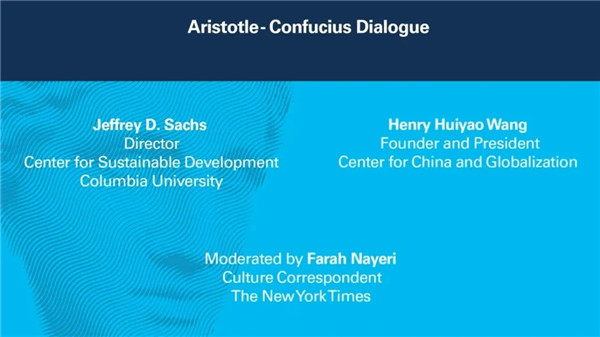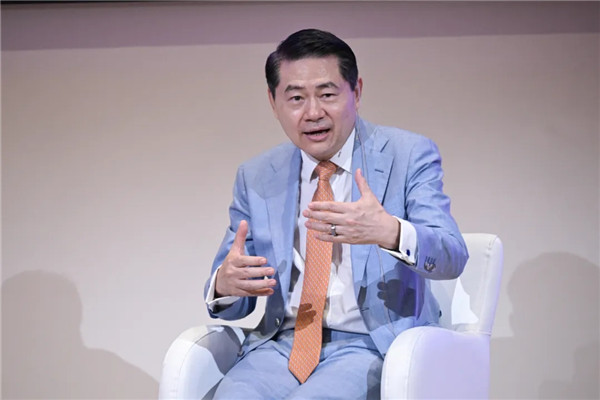Text of “Aristotle-Confucius Dialogue” @ Athens Democracy Forum
October 21 , 2024At the Athens Democracy Forum 2024 in association with The New York Times, CCG President represents Confucius to trace the origins of the Chinese political system.
On October 1, at the Athens Democracy Forum 2024 in association with The New York Times, CCG President Henry Huiyao Wang, representing Confucius, participated in an “Aristotle-Confucius Dialogue” with Jeffrey Sachs, Director of the Center for Sustainable Development at Columbia University, who spoke through the lens of Aristotle. The discussion was moderated by Farah Nayeri, a culture writer for The New York Times.
▲ Athens Democracy Forum | “Aristotle-Confucius Dialogue”
The transcripts Aristotle-Confucius Dialogue:
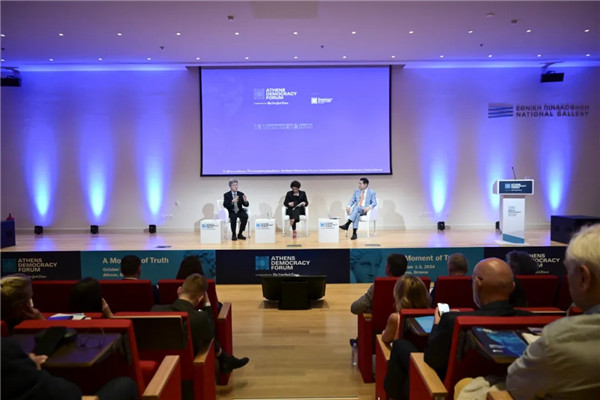
Farah Nayeri
Ladies and gentlemen, a very good evening to all of you! Thank you for being here. Thank you also to those who are watching us live or otherwise on video. I’m Farah Nayeri. I’m a culture correspondent for the New York Times.
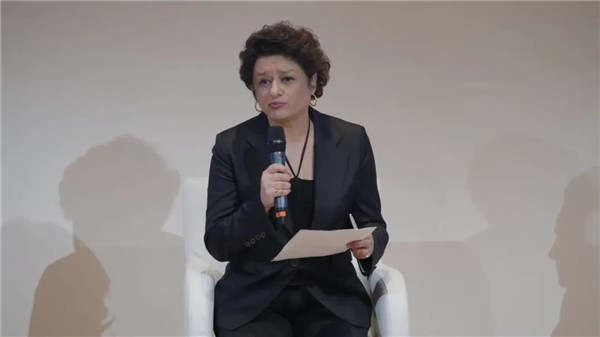
I have moderated many panels in my life, including right here at the Athens Democracy Forum. But I think it’s safe to say that never in all my years have I had speakers of the sheer caliber of the ones that I’m accompanied by this evening on stage, for we are here in the presence of two of the greatest philosophers and thinkers of all time. To my right is the great Greek philosopher Aristotle, who many consider to be the greatest Greek philosopher of all. We are gathered here in Athens, a city where I believe he spent the better part of his life. And to my left is none other than Confucius, the greatest Eastern philosopher of all, whose beliefs and principles are taught and respected all over the world, including, of course, in the People’s Republic of China.
Of course, it is a little odd for a woman to be moderating this particular session. Why? Because Aristotle and Confucius are maybe not as caught up with women’s rights as we would like and maybe not the greatest defenders of gender equality. I’m very sorry to put you both on the spot here. You are not alone. Millions and millions and millions of men in the world today, as we all know, share your views, including in my homeland, Iran. I am, as you can see, an outspoken Iranian woman, of which there are many.
Aristotle’s view is that women should be excluded from politics and public life (I did check this in many historical sources; it really isn’t a gratuitous statement) because they are capable, according to Aristotle, of only limited doses of practical rationality and have a tendency to let their emotions take over. So I’m gonna try and control my emotions this evening and be as rational as I can.
To Aristotle, even though women do have the status of citizens, which is, of course, a very high status in the view of Aristotle, they require permanent rules by their male superiors in public and within the family unit.
As for Confucius, his belief is that women’s role is to take care of household management, be a wife and a mother. There are very few women who have the talent and the virtue to be able to transcend that role and step outside of the domestic realm.
Again, Aristotle and Confucius are by no means alone in holding these views. As I was mentioning earlier, there are, in 2024 (we’re almost in 2025) millions and millions of men who are of the same belief. So I’m gonna jump off my feminist soap box and move on to more pressing topics of discussion with the two great thinkers we have here with us this evening. And what a privilege it really is.
So allow me first to turn to you, Aristotle, you are also known as Professor Jeffrey Sachs, Director of the Center for Sustainable Development at Columbia University. Aristotle, you preach virtue, rationality, choosing for the common good, moderation, and civic participation. What do you think of the state of the world today? And more specifically, what is your view on the way in which the United States of America, the great superpower, is conducting itself?
Jeffrey Sachs
Well, thank you very much. First, I want to thank the organizers for inviting me back to Athens. I left 2,347 years ago. I had to flee that year. You’ll recall that my student, Alexander, died suddenly in Babylon. I was a Macedonian in Athens. It was not entirely safe. So I left. I moved to the Upper West Side of New York. I’ve been teaching at Columbia for a little over 2,000 years, or so it seems. But it’s very nice to be back in Athens, and I’ve loved the neighborhood. If you stroll outside, it’s just a few blocks to my school, the Lyceum. And I do encourage you to take a walk. Remember when we lectured, we walked. We are parapathetic philosophers, and I’d be happy to walk with any of you in the Lyceum and teach you a thing or two.
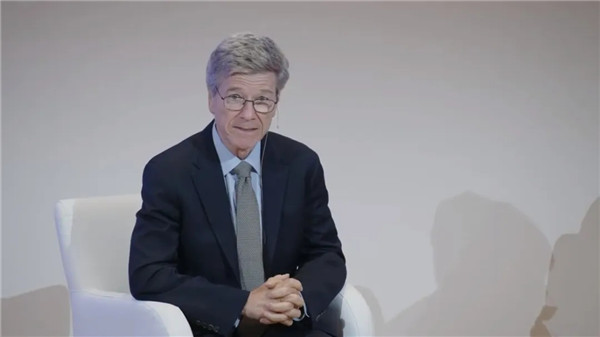
I wrote, as you know, around 200 books. Many of them you’ll only find in a few libraries now, still unexcavated. But a few of them I really do want to draw to your attention, three in particular to address your question.
I wrote De Anima, On the Soul, to help us understand human nature. It was a best seller in 330 BC, it made the New York Times bestseller list, and it’s been on the core curriculum pretty much for the last 2,300 years. It’s about human nature.
A second, I wrote probably the first self-help book in Western culture, which I gave to my son Nicomachus. It came to be known as the Nicomachean Ethics. It was really to help my son grow up, frankly. I told him, behave yourself, moderation in all things. Be a good person. We used the word “arete”, virtue. But just behave and don’t get carried away like an animal. You know, think like a human being. This is the most important point.
When I finished that book, the core that I had established about human nature, among other things, was that people are zoon politikons. As you know, we are social animals. We are political animals. We live in communities. And you probably know a few weirdos who don’t. I said in the Nicomachean Ethics that anyone who would live alone must be either a God or a beast. Some of them are now running for president or other positions, but in general, we are social animals and we need to learn to live together.
So when I finished the Nicomachean Ethics, I gave a course the next semester on Politics, in other words, how to be virtuous as citizens. The Politics is conjoined with the Nicomachean Ethics. One is a kind of self-help for people and the other is a self-help for political systems. And to do that, I did some good empirical research. I got my grad students and they needed term papers. So I got them to collect all the constitutions of the polises of Greece. They collected around 400 constitutions. We analyzed them and then asked the question, which of these produces eudemonia? Which of them delivers happiness?
What we understood was virtue is key to that. How people really behave is key. One of the most interesting things is that the discussion here of this forum, which focuses on a structural issue–democracy–is maybe not really the main point because you can look at the form of government, and I noted three main forms, government of the one, government of the few, and government of the many. But I noted in Politics, which I hope you’ve read several times, there are good forms and there are bad forms.
Just to finish on that. Look, in the United States, we have what I showed was a terrible form of democracy. And the reason is that democracy first has to be based on virtue, but we have crooks as presidents. We have liars as presidents. There’s no sense of virtue. None at all. In fact, really, it’s a democracy only on the surface right now because the hidden state and the plutocratic state really drive so much of American politics. It’s somewhere between how much you take for your political campaign, which will be about $10 billion this year. Everyone’s on the take, by the way.
And the billionaires, which in my society, we didn’t have billionaires. We had a thousandaires and millionaires in drachmas. Now we have billionaires in dollars. Pretty impressive. They buy all of the politics. I warned about this. I said you need a strong middle class if you’re going to sustain really a kind of polis that works, that delivers for the common good, which ours does not.
The second point that I want to emphasize, and then I’ll turn it over to Confucius, cuz I haven’t seen you in 2,300 years. You’re 200 years older than I am, and you’re looking great. So welcome to my hometown.
But I’d like to say that there was a big mistake, a really strange concept called the democratic peace. I don’t know who came up with this weird idea, but it was thousands of years after I had lived in a democratic setting. There was no peace in Athens. This was the most warmongering, imperialistic state. You know, we had demagogues, go for war, go invade Syracusa! How stupid was that? We lost the Peloponnesian wars over this idiot that told us to go invade Syracusa. That’s democracy. You get a demagogue, you go to war. We’ve got demagogues galore. We’re nonstop war right now.
Even as we speak, we’re at war in Lebanon. By the way, that’s a U.S. war. We provide all the bombs, all the money, all the intelligence. And be careful because maybe tomorrow the war will be in Iran also because that’s the real idea of these creeps in our government. And so it’s a very dangerous time. But over to you, Confucius.
Farah Nayeri
Certainly wouldn’t want war anywhere, really. I’m a pacifist, but I wouldn’t want it in my homeland or anywhere.
Jeffrey Sachs
Of course, but that’s what they’re after right now. They’re trying to provoke a war, another war. That’s what Cleon did. This goes back to Athens, my god!
Farah Nayeri
We need to turn to your colleague. I would very much like now to address Confucius, who is also known as Dr. Henry Huiyao Wang, Founder and President of the Center for China & Globalization in Beijing.
Confucius, one of the most famous precepts is “Do not impose onto others what you would not wish to be imposed on you.” This is a moral tenet which, as you’ve told me, encourages individuals to practice empathy, respect in their interactions with others, and promote peaceful coexistence and mutual understanding. But, there doesn’t seem to be a lot of evidence of that in the world today, as Aristotle was pointing out to us just moments ago.
So, Confucius, when you look out on the world with all of your wisdom, what do you see?
Henry Huiyao Wang
Thank you, Farah. And great to be at the Athens Democracy Forum. I’m not as wise as Jeff. But I think even though Confucius is about 200 years older than Aristotle, I can act in today’s world just to reflect a great philosophy of ancient times.
Confucius lived in 500 years BC, but he had 3,000 students and accumulated a lot of teachings and wisdom. What I think he values most is, for example, benevolence. You have to really love the people and be a good governor or good ruler. Fundamentally, you have to love the people. I think that’s the teaching he has throughout history. So even today, it’s a backbone philosophy of the Chinese governance style.
The other thing is that he strikes a balance. He looks for the Doctrine of the Mean because he wants to pursue a neutral way of life and not go to extremes. So I think that’s another thing.
Of course, the other thing he was talking about a lot is, as you mentioned, do not do to others what you do not desire others to do to you. That absolutely reflects the golden rule. We have to consider this as the motto of the world, whether it’s personal relations, government relations, or people-to-people relations. That’s the very wisdom of Confucius. Confucius has a huge impact on China.
Farah
Well, how does he have an impact on China? Because I don’t think the Doctrine of the Mean is something that one can observe in China, whether internally or externally today. You know, it is not a doctrine of moderation. It is not a doctrine of the middle path. It is a system that can be considered not to be a democracy.
Henry Huiyao Wang
We’re here in Athens, which is the origin of Western democracy, but I think democracy needs to be upgraded, innovated, and enhanced. China has Confucius’ values and Confucius’ philosophy has produced a very unique system of China where there is a combination of Confucianism and meritocracy. It’s kind of a form of democracy as well. For example, today in China, every year, almost 14 million students go to the exams and 12 million are selected to colleges. That’s a kind of selection by examination papers. Then you have two to three million college students going for government jobs and about 200,000 are selected by examination papers. It’s a meritocracy that’s been practiced for thousands of years. It’s with a Confucius legacy. That’s governance in China. Also, for government officials in China, you have to gradually work your way through by performance. For example, there are 2,800 counties in China and 260 cities in China above the population of 1 million. Then there are 34 provinces and municipalities of provincial status. You have to really work you way from the village to the township, the county, the municipality, the province, and to the central government. It’s not how good you make a speech in the public square then you become the president. You have to work your way through.
You see there’s meritocracy. There’s selection. There’s Chinese consultative democracy, where, I think, more Confucius value is applied there–dialogue, consultation, and working your way through. So they have a unique model. That’s why you can justify China having lifted 800 million people out of poverty or become the second largest economy in a decade’s time, and now leading the world by green power transition. They must have done something right.
Also, China has 5,000 years of history. It’s the only civilization that was not interrupted or stopped. Its continuity is still there. So there are many merits of China. I think there’s a reason for Confucius to be reflected today.
Farah
Aristotle, we just heard from Confucius, but I did wanna ask you a question because I’ve been listening to your pronouncements–I have to say–on TV and on YouTube. I wanted to ask you, listening to you, I heard a lot of really harsh criticism of your homeland, the United States of America. And, I don’t know whether it’s for the sake of argument, but you also are very, almost defending or explaining the policies of America’s adversaries, such as China, such as Russia. Why do you do that?
Jeffrey Sachs
First of all, it’s the responsibility of a philosopher to critique one’s own society. My colleague Confucius spent almost all his life wandering from kingdom to kingdom trying to get some ruler to listen to him. Finally, at age 70, and I’m familiar with that, too, you sit down and you would teach your students. And then they write your Analects based on your teachings.
It’s very hard to get rulers to listen, but I do believe that it’s extremely important to critique one’s own society first because we have a very hard time understanding ourselves. And you remember what we all know from the temple of Apollo at Delphi. What are the first words on the wall? Know thyself. This is the key. We don’t know our own society.
I was reading The New Yorker. It’s undigestible propaganda, if you know. And so are your pages very often because you’re telling people what they wanna hear, not what’s true. And this is the job of a philosopher to say this.
There was another great sage. He’s a kid, Jesus. He was born about 380 years after I was. And he used to say, why do you point to the mote in the other person’s eye when you have the beam in your own eye? You know, it’s very clever. I think Jesus’ foreign policy is exactly right. Take the beam out of our own eyes, understand what we’re doing, and then we can make peace with others because this is the whole idea that you have a relationship.
I think Confucius made brilliant points about the decency of relationship. Book 8 of my Nicomachean Ethics was telling Nicomachus, make friends, learn how to be friendly with other people. You have to listen to them. We’re not good at that right now. That’s why I do it.
But I also know something went haywire in the United States in 1947. We created the CIA. We have a deep state. We really do. If you have done 44 years of work like I have–again, that’s only part of my 2,300-year career–but still at that the more recent period, I see the United States lying all the time. By the way, one day there was a coup in Haiti. The President had said to me, they’re gonna take me out, because he asked me to be his economic advisor. This was Aristide. The CIA walked in, put him on an airplane, flew him 23 hours to the Central African Republic in a coup. I called the New York Times reporter on the beat, aren’t you gonna cover this? She said to me, well, my editor is not very interested in a coup in broad daylight. This is literally the truth. I’m sorry to pick on one paper. It just is the one that comes to mind today.
You asked Confucius, well, it’s not a democracy. But again, read my book. Read the Politics. Democracy can be mob rule. It can be plutocracy. It’s a form. I want a mixed form of government. I want the meritocracy. And, you know, we, the donors, pay money and then they become our representatives all over the world cuz they put in some money. But here, you get an exam, you’re the best in the exam. My experience is that the Chinese senior officials are so much better trained than the American senior officials. It’s a huge difference.
Farah
That’s a compliment to you, isn’t it, Henry? Henry, I would basically like you as Aristotle did. Confucius, it would be great if you could critique, as he did, the system that he emanates from. Can you critique your system?
Henry Huiyao Wang
Absolutely. We live in a world of democracy. That’s why I think this form is a democracy form. The thing is, China is critiqued by countries around the world all the time. We live in a world of 200 some nations, the biggest opposition parties beingthe United States and of course, probably the EU, too. So China is constantly being criticized.
That’s why democracy needs to be innovative and upgraded. For example, in China, you have a big digital democracy. You know, there are 1 billion smartphone users. Where to go, what to buy, what to prefer, they’re voting by the mobile phone wallets on a daily basis. That’s also a democracy. Also, there’s big data. People are not foolish anymore. They can really use the big data to accurately cure a patient or to cure the governor officials if they make a big mistake.
I think the old notion that there’s only a public square for debates and that after debates, you pick a leader probably needs to be innovated because, in China, you have to rise through all the ranks, from the county to the municipality to the provinces to the central government by performance. If you look at the 2,800 counties in China, all the mayors are competing with each other. So this is a form of a new democracy, or I would say, meritocracy in democracy form. And that works. If people are not familiar with that, I think it’s great that we go back to the roots of Confucius. That’s where everything comes from.
Meritocracy has been practiced in China for thousands of years. The Mandarin system was invented thousands of years ago. So it’s not really something new. China has been doing it for its 5,000 years of continuous civilization and then married it with technology, globalization, and the market system. They created a miracle. We probably need a new look at what China is doing and forget about those old divide of democracy versus autocracy kind of narrative. We need a new narrative.
Farah
I think we have a new narrative tonight cuz I mean, here we have the United States being portrayed as a plutocracy full of crooks and liars. And here we have the People’s Republic of China defined as a meritocracy, where you rise on your merits. I think that we do need to think in different ways and fresh ways.
Note: The above text is the output of transcribing from an audio recording. It is posted as a reference for the discussion.
Related:
China Daily | Wang Huiyao: Chinese democracy a blend of traditional wisdom, innovation
Topical News See more

